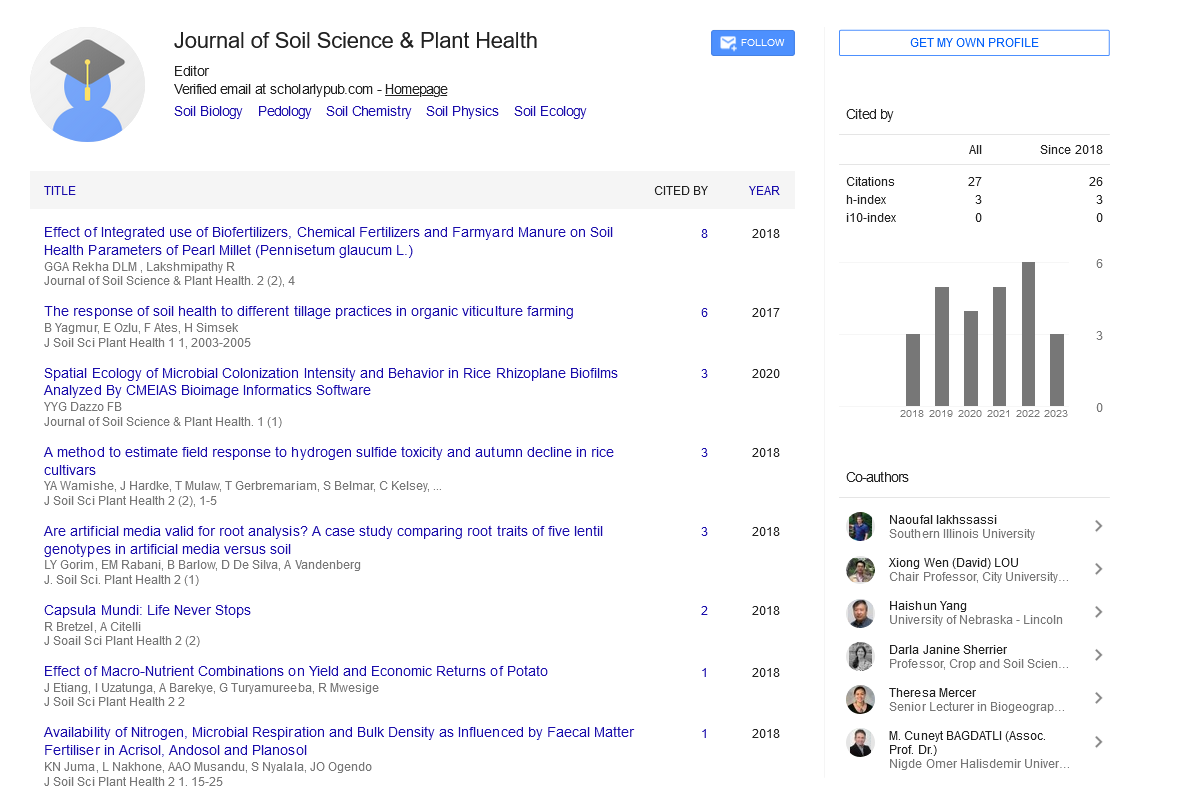Opinion Article, Vol: 7 Issue: 4
Greening Agriculture: Plant Growth Promoters in Sustainable Farm Management
Samwel Shimo*
1Department of Crop Science and Horticulture, College of Agricultural Sciences and Technology (CoAST), Mbeya University of Science and Technology (MUST), Mbeya, Tanzania
*Corresponding Author: Samwel Shimo,
Department of Crop Science and
Horticulture, College of Agricultural Sciences and Technology (CoAST), Mbeya
University of Science and Technology (MUST), Mbeya, Tanzania
E-mail: samwel.shimo@must.ac.tz
Received date: 31 July, 2023, Manuscript No. JSPH-23-113275;
Editor assigned date: 02 August, 2023, PreQC No. JSPH-23-113275 (PQ);
Reviewed date: 16 August, 2023, QC No. JSPH-23-113275;
Revised date: 23 August, 2023, Manuscript No. JSPH-23-113275 (R);
Published date: 30 August, 2023, DOI:10.4172/jsph.1000210
Citation: Shimo S (2023) Greening Agriculture: Plant Growth Promoters in Sustainable Farm Management. J Soil Sci Plant Nutr 7:4.
Description
Sustainable agriculture has become a critical concern in our rapidly changing world. As the global population continues to rise and environmental challenges intensify, it is imperative that we find innovative and eco-friendly ways to enhance crop productivity while minimizing the negative impact on the environment. In this context, plant growth promoters have emerged as essential tools in the pursuit of sustainable agriculture. These natural or synthetic compounds play a crucial role in improving crop yields, nutrient uptake, and stress tolerance while reducing the reliance on harmful chemical fertilizers and pesticides. This essay explores the multifaceted role of plant growth promoters in sustainable agriculture, highlighting their benefits, mechanisms of action, and potential for addressing the challenges of modern farming.
Plant growth promoters, often referred to as Plant Growth Regulators (PGRs) or phytohormones, are a diverse group of organic compounds that regulate various aspects of plant growth and development. They can be categorized into five main classes: auxins, gibberellins, cytokinins, abscisic acid, and ethylene. Additionally, other compounds such as brassinosteroids and jasmonic acid also play important roles in plant growth regulation. One of the primary benefits of plant growth promoters in sustainable agriculture is their ability to enhance crop yields. Auxins, for example, promote cell elongation and differentiation, which is crucial for root development and overall plant growth. Gibberellins stimulate stem elongation and flowering, leading to increased crop biomass. Cytokinins are known to promote cell division, resulting in more branches and higher yields. By harnessing the power of these growth regulators, farmers can achieve better harvests without resorting to excessive chemical inputs.
Furthermore, plant growth promoters can improve nutrient uptake efficiency, which is pivotal for sustainable agriculture. For instance, auxins can stimulate the development of root hairs and increase the root's surface area, allowing plants to absorb more water and nutrients from the soil. Cytokinins play a role in nutrient translocation within the plant, ensuring that essential elements are transported to where they are needed most. By optimizing nutrient uptake, these growth promoters reduce the need for synthetic fertilizers, thereby decreasing the environmental impact associated with their production and application.
In addition to enhancing growth and nutrient uptake, plant growth promoters also contribute to stress tolerance in crops. With climate change and increasing environmental stressors, such as drought, salinity, and extreme temperatures, crop resilience has become a critical factor in sustainable agriculture. Abscisic acid, for example, regulates the plant's response to water stress by closing stomata and reducing water loss. Ethylene is involved in the response to various stress factors, including pathogen attacks. By improving a plant's ability to withstand adverse conditions, growth promoters help ensure crop stability and food security in the face of environmental challenges. Plant growth promoters are not limited to natural phytohormones synthetic growth regulators have also been developed to address specific agricultural needs. For instance, plant growth retardants can be used to control excessive stem elongation in certain crops, making them more compact and easier to manage.
These synthetic compounds can be employed strategically to optimize plant architecture and reduce lodging, which can lead to significant yield losses. In sustainable agriculture, it is crucial to strike a balance between improving crop productivity and minimizing the negative environmental impact of farming practices. Plant growth promoters offer a promising solution in this regard by reducing the reliance on chemical fertilizers and pesticides. When used judiciously, growth promoters can promote healthier plant growth, leading to decreased susceptibility to pests and diseases. This, in turn, reduces the need for chemical interventions, which can harm beneficial insects, contaminate soil and water, and contribute to the development of pesticide-resistant pests. Moreover, the use of plant growth promoters aligns with the principles of organic and agroecological farming, which prioritize environmentally friendly and sustainable practices. Organic farming, in particular, prohibits the use of synthetic chemicals, making natural plant growth promoters an essential tool for maintaining soil health and crop quality in organic systems. These compounds offer organic farmers a means to boost yields while adhering to strict ecological standards.
However, it is essential to recognize that the use of plant growth promoters is not without challenges and potential drawbacks. Improper application or overuse of these compounds can lead to undesirable effects, such as abnormal growth patterns or reduced fruit set. Additionally, there is a need for continued research to better understand the intricate interactions between different growth promoters and their effects on specific crops. To harness the full potential of plant growth promoters in sustainable agriculture, it is crucial to develop precise and tailored application strategies.
The plant growth promoters play a vital role in sustainable agriculture by enhancing crop yields, improving nutrient uptake efficiency, increasing stress tolerance, and reducing the reliance on chemical inputs. These compounds, whether natural phytohormones or synthetic growth regulators, offer innovative solutions to the challenges of modern farming while promoting eco-friendly and environmentally responsible practices. As we strive to feed a growing global population while safeguarding our planet, the intelligent use of plant growth promoters represents a promising avenue towards achieving a more sustainable and resilient agricultural future.
 Spanish
Spanish  Chinese
Chinese  Russian
Russian  German
German  French
French  Japanese
Japanese  Portuguese
Portuguese  Hindi
Hindi 